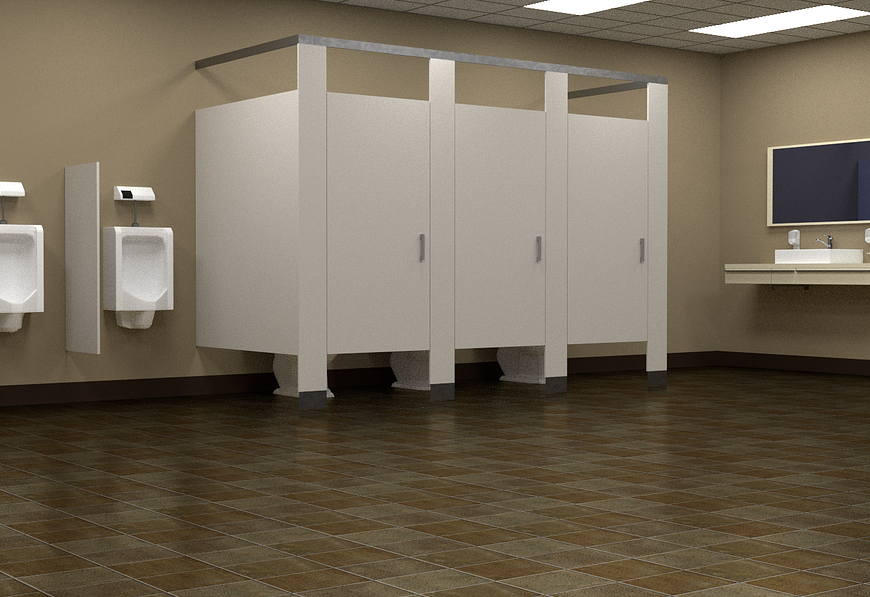By now you have probably heard about North Carolina’s terrible, horrible, no good, very bad law which requires people to use bathrooms based on their physical anatomy rather than on the gender with which they self-identify. Opponents have challenged the law in court and are certain that it will be struck down as unconstitutional. Their confidence is misplaced and I want to explain why.
The controversy began in Charlotte where the city council repealed an existing ordinance that specifically excepted restrooms, showers, and similar facilities from the prohibition on sex discrimination. At the same time, the city council added sexual orientation and gender identity (SOGI) as protected classes under the city’s public accommodations ordinance. Repeal of the restroom exception combined with the new SOGI protections made clear that Charlotte businesses and other places open to the public could no longer separate men and women in such facilities on the basis of sex or gender identity.
The North Carolina state legislature convened a special session before the Charlotte ordinance went into effect and passed the Public Facilities Privacy and Security Act, otherwise known has HB2, that voided the ordinance and preempted similar efforts by localities in the future. Such statewide preemption is permissible in North Carolina because local governments can exercise only those powers given them by the state legislature.
The most controversial parts of HB2 are its bathroom and public accommodations provisions. HB2 requires that multi-occupancy bathrooms, showers, locker rooms, and other changing facilities in public schools and government agencies be separate based on biological (birth) sex. HB2 also creates a new statewide public accommodations law that prohibits discrimination on the basis of race, religion, color, national origin, or biological sex, but does not include sexual orientation or gender identity (SOGI).
Start your day with Public Discourse
Sign up and get our daily essays sent straight to your inbox.Accusations of Unconstitutional Discrimination
The ACLU claimed that HB2 is the “most egregious, sweeping, hate-filled anti-LGBT legislation in this country’s history” and that the law “makes it public policy to harass, bully, humiliate, target, and punish LGBT people—especially transgender people just trying to use a bathroom.” The Charlotte Observer went so far as to compare North Carolina’s Governor McCrory to racist Southern governors George Wallace, Orville Faubus, and Ross Barnett for signing the bill into law.
As expected, gay and transgender activists claim HB2 is unconstitutional and they have sued North Carolina in federal court. The lawsuit raises a number of legal claims, including violations of equal protection and privacy rights.
No federal court has held that a biological male who self-identifies as a female has a constitutional right to use female restrooms, showers, locker rooms, and other similar single-sex facilities (or vice versa). Activists nevertheless hope the North Carolina lawsuit will end up on appeal before progressive judges at the Fourth Circuit who will blaze a new trail for transgender rights under the Constitution.
Even if that hope is not realized, opponents are confident that HB2 is unconstitutional under the Supreme Court’s 1996 decision in Romer v. Evans. In that case, the Supreme Court struck down an amendment to Colorado’s constitution that banned protections for gays, lesbians, and bisexuals in Colorado antidiscrimination laws. Justice Kennedy, writing for the majority, said the law was unconstitutional because it was motivated by animosity toward homosexuals and the bare desire to harm them (“animus”).
False Comparison to Romer
But Romer does not fit the facts here. The Supreme Court inferred animus based on several features of the Colorado amendment, none of which is present with HB2:
- The text of Colorado’s amendment expressly singled out “homosexuals, lesbians, bisexuals” and withdrew protection from them, but no others.
HB2 is different: Its language does not target a specific group or class for unfavorable treatment. It simply protects some classes, but not others. HB2’s public accommodations provision, for example, protects against discrimination based on race, religion, color, national origin, and biological sex. While it doesn’t include SOGI, it also doesn’t include age, disability, economic class, pregnancy, marital status, veteran status, or other less commonly protected classes. Thus, at most, HB2 “targets” only by omission—and even then, it does not target a single omitted group, but rather several omitted groups.
- Colorado’s amendment barred all governmental action—legislative, executive, and judicial—at any level that protected gays. It also nullified legal protections for gay people in the private sector.
HB2 is much narrower: Its nondiscrimination provisions reach only public accommodations, employment, and government contracting. Local governments specifically are exempted in their employment policies—so local laws in Charlotte, Raleigh, and other cities prohibiting discrimination on the basis of sexual orientation for city employees remain valid after HB2. Private businesses also remain free to add SOGI protections to their nondiscrimination policies. HB2’s bathroom and locker-room provisions apply only to government facilities, and the law specifically allows for creation of single-occupancy restrooms to accommodate transgendered persons. Additionally, transgendered persons who have undergone sex reassignment surgery can use bathrooms based on their reassigned gender because North Carolina permits such persons to change the gender on their birth certificates.
- The Supreme Court described the Colorado amendment as “unprecedented in our jurisprudence.”
HB2 is different: It stands within the mainstream of nondiscrimination laws nationwide. HB2’s public accommodations provision protects slightly broader categories than the federal public accommodations law, and is consistent with public accommodations laws in thirty-two other states that do not include SOGI. HB2’s employment discrimination provision is consistent with federal employment discrimination law, which does not specifically cover SOGI, as well as the nondiscrimination laws of thirty states that do not include SOGI.
- The Colorado amendment permitted citizens to obtain nondiscrimination protections at the local level, except for gay people who were forced to seek a constitutional amendment by supermajority vote to gain the same protections.
HB2 is different: It does not make LGBT persons unequal to everyone else. After HB2, no person can obtain nondiscrimination protections at the local level. The new law simply shifts the political process for granting nondiscrimination protections from local governments to state government. If you want your favored class to receive nondiscrimination protection, like everyone else, you must lobby the state legislature to change the law. Additionally, there is no constitutional provision preventing the North Carolina legislature from adding protected classes by simple majority vote.
- The Supreme Court held in Romer that the Colorado amendment did not serve any legitimate governmental purpose.
HB2 is different: The stated purpose of HB2’s nondiscrimination provision is to improve North Carolina commerce by ensuring the uniformity of nondiscrimination laws statewide for businesses, organizations, and employers. Without HB2, an employer who does business in multiple locations across the state would be subject to differing public accommodation and employment regulations in each municipality or county. For HB2’s facilities provisions, North Carolina also has legitimate interests both in balancing its citizens’ privacy concerns and in ensuring safety in separate-sex multi-user bathrooms, locker rooms, and showers.
The argument against HB2 comes down to this: North Carolina has shown animus toward gays and transgendered persons because (1) it did not give transgendered persons the right to use the bathroom, shower, or locker room of their choice, despite their bodily differences, and (2) it replaced a local nondiscrimination law having SOGI protections with a statewide law that does not include SOGI protections.
Conflicting Privacy Interests
Why does North Carolina necessarily show animus towards transgender persons if the state legislature decides that it can’t give them everything they want? Unfortunately, privacy rights in multi-occupancy bathrooms, showers, and locker rooms are a zero-sum game—whatever one side gains, the other loses. While transgender persons have legitimate privacy concerns, so do non-transgender persons, who will be required to disrobe, shower, and perform personal bodily functions in the presence of those with intimate body parts different from their own. As Ryan Anderson has pointed out, the reason we have separate sex-specific bathrooms and locker rooms is because men and women have different bodies and we want to protect privacy related to our bodies, not to our gender identities. Transgender advocates have not explained why North Carolina is constitutionally required to balance its citizens’ privacy interests in favor of permitting transgender people access to the bathroom or locker room of their choice.
Designating public bathrooms and similar facilities based on biological sex, but accommodating transgender persons by creating single-occupancy or controlled-use facilities, seems like a sensible compromise that balances everyone’s privacy concerns. But transgender persons—at least the two plaintiffs in the North Carolina lawsuit—don’t want to use single-occupancy bathrooms because they say it stigmatizes them, even though other people use single-occupancy bathrooms because it better suits their privacy preferences and they don’t feel stigmatized. This brings us back to the question: If the North Carolina legislature, because of privacy and safety concerns, wants to preempt local ordinances granting transgender persons access to the bathrooms of their choice, why is that necessarily “targeting” motivated by animus rather than a permissible balancing of conflicting privacy interests?
Privileging LGBT Interests
North Carolina’s omission of SOGI in its statewide public accommodations law raises similar questions. Does the Constitution require the inclusion of SOGI in all discrimination laws? Are existing federal and state laws that do not include SOGI unconstitutional? What other classes does the Constitution require to be included—disability, age, economic class, pregnancy, veteran status, familial status? Is animus shown toward every class not included?
Gay and transgender activists cannot answer these questions without privileging LGBT persons over other groups. But such LGBT exceptionalism has no basis in traditional equal protection analysis. It derives instead from a misreading of Romer that assumes any and all opposition to LGBT laws is based solely on hate. Historic views of the family, privacy and safety considerations, religious liberty concerns, devout religious beliefs, and even political calculations are quickly dismissed as illegitimate, and persons holding those views are depicted simply as demonizing LGBT persons.
While Justice Kennedy arguably embraced this broader concept of animus in his majority opinion in Windsor, the Defense of Marriage Act case, his finding of animus was incoherent: Did he really think that Bill Clinton and other progressives who supported DOMA actually hate gays? Romer’s flaw always has been the assumption of animus based on judicial intuition without empirical evidence of actual hostility. While Windsor unleashed a surge of support for gay marriage in lower courts, most of those decisions refused to embrace its animus argument. Curiously, in Justice Kennedy’s majority opinion in Obergefell, the case redefining marriage nationwide, he cited Romer only once in passing and never mentioned “animus” at all.
Given such judicial uncertainty over the animus argument, some LGBT supporters opposing HB2 have tried to recast Romer as a political process case, even though Justice Kennedy specifically disavowed reliance on that rationale. One law professor, for example, argues that Romer should be read broadly to prohibit state governments from depriving politically unpopular minorities of obtaining nondiscrimination protections from local governments. The Constitution apparently would empower a single municipality in North Carolina to constrain the state legislature from passing a statewide nondiscrimination law if it’s inconsistent with an ordinance that municipality has adopted. Would the result be different if North Carolina had passed HB2 before Charlotte passed its ordinance?
This reading of Romer proposes an unprecedented intrusion on state sovereignty, especially in states like North Carolina where local governments derive their powers wholly from the state legislature and where state laws typically preempt contrary local ordinances. Moreover, LGBT persons are hardly a “politically unpopular group” in North Carolina, as shown by widespread political opposition both to HB2 this year and to a proposed but ultimately defeated state RFRA last year.
Properly understood, neither the animus nor political process interpretations of Romer justifies the certainty of HB2’s opponents that the law will be struck down. Unfortunately, no one can safely predict nowadays what courts will do in cases of LGBT laws.














